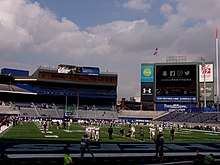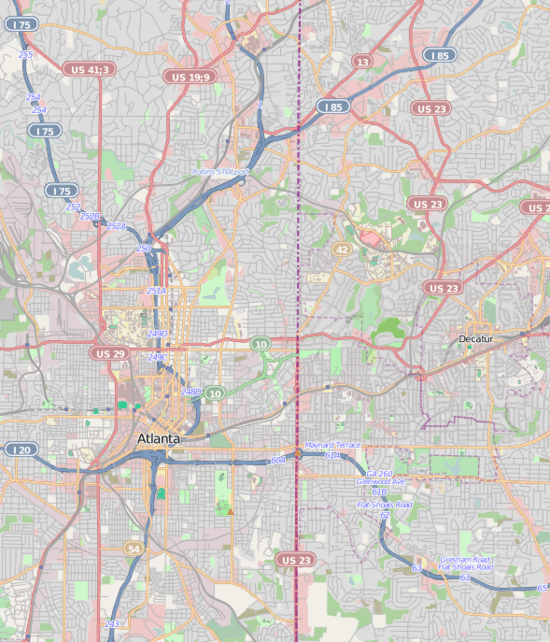Center Parc Stadium
Center Parc Stadium (formerly Georgia State Stadium)[8] is a college football stadium in Atlanta, Georgia. The stadium is the home of the Georgia State University Panthers football team as of the 2017 season, replacing the Georgia Dome which had served as their home stadium from the program's inception in 2010 until 2016.[9] It was also the home of the Atlanta Legends of the Alliance of American Football (AAF).
 | |
 Georgia State Stadium in December 2017 | |
 Center Parc Stadium Location in Atlanta  Center Parc Stadium Location in Georgia  Center Parc Stadium Location in the United States | |
| Former names | Centennial Olympic Stadium (1996) Turner Field (1997–2016) Georgia State Stadium (2017–2020) |
|---|---|
| Address | 755 Hank Aaron Drive SE[1] |
| Location | Atlanta, Georgia |
| Coordinates | 33°44′7″N 84°23′22″W |
| Owner | Georgia State University |
| Operator | Georgia State University |
| Capacity | 24,333[2] |
| Surface | FieldTurf[3] |
| Construction | |
| Broke ground | July 10, 1993 (as Centennial Olympic Stadium) |
| Opened | August 18, 2017 |
| Renovated | 1996–97 (reconfigured as Turner Field) 2017 (reconfigured for American football) |
| Construction cost | $209 million (as Centennial Olympic Stadium)[4] ($341 million in 2019 dollars[5]) |
| Architect | Atlanta Stadium Design Team (a joint venture of Heery International, Inc., Rosser International, Inc., Williams-Russell and Johnson, Inc. and Ellerbe Becket, Inc.)[6] |
| Tenants | |
| Georgia State Panthers (NCAA) (2017–present) Atlanta Legends (AAF) (2019)[7] | |
Center Parc Stadium was originally built for the 1996 Summer Olympics as Centennial Olympic Stadium. Following the 1996 Summer Paralympics, the Olympic Stadium was reconfigured as designed into the baseball-specific Turner Field, serving as the home of the Atlanta Braves of Major League Baseball from 1997 until 2016. After the Braves' departure for Truist Park in Cobb County, Georgia State University acquired Turner Field and its surrounding parking lots for a large scale expansion of the Georgia State campus, which includes new private and student housing, academic, and retail space, in addition to the stadium redevelopment.
History
1996 Summer Olympics
The stadium was originally constructed as the 85,000-seat Centennial Olympic Stadium and used for the 1996 Summer Olympics. Private entities, including NBC and other Olympic sponsors, agreed to pay a large sum of the cost to build Centennial Olympic Stadium (approximately $170 million of the $209 million bill). It was complete and ready for the Opening Ceremony in July 1996, where it hosted track and field events and the closing ceremony.
Turner Field
Immediately after the 1996 Summer Paralympics, which followed the Olympics, the stadium went through its first conversion. Much of the north end of the stadium was removed in order to convert it to its permanent use as a 49,000-seat baseball park. The stadium hosted the Atlanta Braves of Major League Baseball from 1997 to 2016, following a multimillion-dollar renovation to retrofit the stadium for baseball by removing the temporary stands that had made up nearly half the stadium and building the outfield stands and other attractions behind them.
The Atlanta Committee for the Olympic Games (ACOG) sought to build the stadium in a way that it could be converted to a new baseball stadium, and ACOG paid for the conversion. This was considered a good agreement for both the Olympic Committee and the Braves. The 71,000-seat Georgia Dome had been completed four years earlier by the state of Georgia to become the home of the National Football League's Atlanta Falcons, so there was no need for another large stadium in downtown Atlanta. Furthermore, the Braves had already been exploring opportunities for a new stadium. The Atlanta Fulton County Recreation Authority owned the stadium and leased it to the Braves, who operated the stadium. As Turner Field, the stadium hosted notable events such as games 1 and 2 of the 1999 World Series and the 2000 Major League Baseball All-Star Game. The end of the Braves' most recent lease in 2016 coincided with the team's departure for Truist Park.[10]
Conversion to Center Parc Stadium
In November 2013, the Atlanta Braves announced that they would vacate Turner Field upon the expiration of their lease in 2016 after negotiations between the team and the city of Atlanta to extend the lease broke down.[11] According to then-Braves vice chairman John Schuerholz, Turner Field required $350 million in renovations—$150 million for structural upkeep and $200 million to improve the fan experience.[12] Then-Atlanta mayor Kasim Reed stated that the city could not afford the cost of the renovations desired by the Braves while also partially funding the construction of Mercedes-Benz Stadium for the Falcons[13] and the renovation of Philips Arena (now known as State Farm Arena) for the National Basketball Association's Atlanta Hawks.[14]
Between April and May 2014, Georgia State University announced its intentions to pursue the 77-acre (310,000 m2) Turner Field site for a mixed use development. One proposed development plan included reconfiguring Turner Field into a football stadium and building a new baseball field on the footprint of the former Atlanta–Fulton County Stadium, incorporating the wall where Hank Aaron hit his historic 715th home run; an alternate proposal submitted in November 2015 proposed adaptively reusing portions of the ballpark for a mixed housing and retail development while a new football-specific stadium was built to the north along with the aforementioned new baseball field.[15][16] On December 21, 2015, the Atlanta Fulton County Recreation Authority announced that they had accepted Georgia State's bid for the stadium property.[17] It was decided to go with the reconfiguration plan and on August 18, 2016, Georgia State and the Atlanta-Fulton County Recreation Authority reached a tentative purchase agreement for Turner Field, and the purchase and redevelopment plan was approved by the Board of Regents of the University System of Georgia on November 9, 2016.[18][19]
The sale of the Turner Field property to Georgia State was officially closed on January 5, 2017, with the stadium conversion project beginning in February 2017.[20] The stadium acquisition and renovation project was expected to cost $52.8 million; the university did not expect to add or increase student fees to fund the project, and the proceeds would come from revenue from bookstore operations, parking, and housing, as well as private donations. Renovations took place over multiple phases, and included installing an artificial turf playing surface, reorienting the lower bowl, covering upper deck seating, and upgrading locker rooms. Initial capacity for the stadium was 23,000, with future expansion for 33,000. In addition to football, the university intends to use the stadium as a multipurpose facility.[19]
The university announced on February 9, 2017 that the Panthers' first game in Georgia State Stadium was scheduled for August 31, 2017 against Tennessee State.[21] Reconstruction for Georgia State Stadium began on February 27, 2017, and the first phase of construction was completed prior to the Panthers' first scheduled game at the stadium. The second phase of construction took place in 2018 and built out the remainder of the stadium. While the university planned to tailor the stadium to suit the Panthers' football team and its future needs, the university also planned to honor the legacy of the 1996 Olympics and the Braves' tenure at the stadium.[22] On August 8, 2017, the university announced that the playing surface would be named in honor of Georgia State alumnus Parker H. "Pete" Petit, who contributed $10 million towards the Panthers athletic program.[23]
On September 21, 2017, WSB-TV reported that an August inspection by a fire protection company found several deficiencies with the stadium's fire sprinkler system. University officials were aware of several issues in need of repair when they acquired the stadium, but they did not realize the full scope of the fire protection system's defects until the report was released. Despite the report, the state's Fire Marshal's office issued a conditional occupancy certificate for the stadium with the university using a state-approved Fire Watch system.[24]
Prior to and since the acceptance of the bid from Georgia State and developers Carter and Oakwood Development for Turner Field, residents of the Summerhill and Mechanicsville neighborhoods, which lie adjacent to the stadium, have expressed their criticisms over the impending development, particularly over the potential of being displaced due to gentrification, despite both Georgia State and the developers seeking input from local residents to help mitigate their concerns. In April 2017, protesters set up a tent city near the stadium; however, the encampment was removed by the Georgia State Police Department at the behest of Summerhill residents in June 2017 for health and safety reasons.[25]
On August 11, 2020, the university entered a naming rights agreement for Georgia State Stadium with the Atlanta Postal Credit Union. The stadium was renamed Center Parc Credit Union Stadium, or Center Parc Stadium for short, in a contract lasting 15 years and valued at $21 million.[8]
Stadium firsts
The stadium's first event was the 2017 Corky Kell Classic, a series of high school football games, on August 18 and 19, 2017.[26] The first Panthers home game in the stadium was on August 31, 2017, a 17–10 loss to the Tennessee State Tigers in front of an announced sellout crowd of 24,333.[27] Georgia State's first home victory at Georgia State Stadium came on October 26, 2017 with a 21–13 victory over the South Alabama Jaguars.[28]
Foo Fighters played the first concert at Georgia State Stadium on April 28, 2018 as part of the Concrete and Gold Tour.[29]
The Legends' first home game was played on February 24, 2019 against the Birmingham Iron, where they lost 28-12.[30][31]
Other events
In 2018, Georgia State Stadium became the new neutral home of the MEAC/SWAC Challenge.[32]
On May 7, 2019, the Georgia High School Association (GHSA) announced that the football championships would be moved from Mercedes-Benz Stadium to Georgia State Stadium starting in the 2019 season, citing the higher costs of renting Mercedes-Benz Stadium compared to the former Georgia Dome. The GHSA's two years at Mercedes-Benz Stadium were also marred by logistical issues, with the six of the eight 2017 championship games postponed and moved to school sites due to a winter storm hitting Atlanta on the weekend of the championships, and the 2018 championships were moved to mid-week due to Major League Soccer's Atlanta United FC hosting MLS Cup 2018 on December 8.[33]
Access and transportation
Center Parc Stadium is located in the Southeastern Atlanta neighborhood of Summerhill.[34] It is located on Hank Aaron Drive, which provides multiple parking areas.
Center Parc Stadium is also accessible from multiple bus routes near the stadium courtesy of MARTA. MARTA does not offer a direct rail station at the stadium; however, it can be accessed from the Georgia State station on the Blue/Green Line.[35]
References
- "About Georgia State Stadium". Georgia State Athletics. Archived from the original on 18 September 2018. Retrieved 11 July 2017.
- "The Stadium - Georgia State University". Retrieved 5 December 2016.
- "Georgia State Stadium Set for FieldTurf Surface". Georgia State Athletics. Retrieved 11 July 2017.
- Sandomir, Richard (July 30, 1996). "At Close of Games, Braves Will Move Into Olympic Stadium". The New York Times. Retrieved July 24, 2008.
- Federal Reserve Bank of Minneapolis. "Consumer Price Index (estimate) 1800–". Retrieved January 1, 2020.
- Turner Field Archived 2009-06-18 at the Wayback Machine architect: Ellerbe Becket official site
- Culpepper, JuliaKate E. (April 25, 2018). "Michael Vick will lead offense of new pro football league team in Atlanta". Atlanta Journal-Constitution. Retrieved April 25, 2018.
- "Center Parc Credit Union Announces Naming-Rights Sponsorship for Georgia State Stadium Center Parc Credit Union Announces Naming-Rights Sponsorship for Georgia State Stadium". Georgia State University. Retrieved August 11, 2020.
- Tim Tucker. "How Turner Field turned into Georgia State's football stadium". Myajc.com. Retrieved 28 February 2019.
- Kendrick, Scott. "Turner Field". About.com. Retrieved July 24, 2008.
- Bowman, Mark (November 11, 2013). "Braves leaving Turner Field for Cobb County". Major League Baseball Advanced Media. Retrieved October 6, 2016.
- Klepal, Dan (May 20, 2014). "Braves: We're Assuming Ultimate Risk". The Atlanta Journal-Constitution. Retrieved May 20, 2014.
- Henry, George (November 11, 2013). "Braves Planning New Suburban Stadium in 2017". Yahoo News. Associated Press. Retrieved August 9, 2016.
- Trubey, J. Scott; Vivlamore, Chris. "Kasim Reed announces deal to keep Hawks in Philips Arena". The Atlanta Journal Constitution. Retrieved 2 November 2016.
- Roberson, Doug (7 May 2014). "Georgia State wants to turn Turner Field into football stadium". Atlanta Journal-Constitution. Retrieved 3 June 2014.
- Richards, Doug. "Georgia State: Build two new stadiums at Turner Field". WXIA. Archived from the original on 17 October 2017. Retrieved 26 December 2015.
- Leslie, Katie; Trubey, J. Scott. "Turner Field to be sold to Georgia State and developer Carter". Atlanta Journal-Constitution. Retrieved 22 December 2015.
- Davis, Janet; Suggs, Ernie; Trubey, J. Scott. "Georgia State, partners reach deal to buy Turner Field for $30 million". The Atlanta Journal-Constitution. Retrieved 18 August 2016.
- Brown, Molly; Trubey, Scott. "Georgia State's $53M Turner Field redevelopment plan approved". The Atlanta Journal Constitution. Retrieved 9 November 2016.
- "Georgia State, Private Development Venture Finalize Acquisition of Turner Field Site". Georgia State University. Retrieved 6 January 2017.
- Holmes, Mike. "Football Stadium Opener Date Set". Georgia State Athletics. Retrieved 10 February 2017.
- McQuade, Alec. "Turner's transformation: GSU's new football stadium is beginning to take shape". WXIA. Retrieved 26 March 2017.
- "Georgia State names football field for business leader Parker H. "Pete" Petit". Georgia State Sports Communications. Retrieved 8 August 2017.
- Carr, Nicole. "Inspection uncovers serious safety problems at Georgia State Stadium". WSB-TV. Retrieved 25 September 2017.
- Godwin, Becca J. G. "GSU police remove 'Tent City' from Turner Field". The Atlanta Journal-Constitution. Retrieved 7 June 2017.
- Ellerbee, Seth. "Georgia State Stadium ready for its Corky Kell debut". Scoreat1.com. Retrieved 15 August 2017.
- "Tennessee St ruins Georgia St's debut at former Turner Field". Usatoday.com. Retrieved 28 February 2019.
- "South Alabama vs. Georgia State - Game Summary - October 26, 2017 - ESPN". ESPN.com. Retrieved 28 February 2019.
- Ruggieri, Melissa. "Concert review and photos: Foo Fighters, The Struts christen Georgia State Stadium with electrifying rock show". The Atlanta Journal-Constitution. Retrieved April 29, 2018.
- "Where to find Atlanta Legends football on TV, online". The Atlanta Journal-Constitution. February 6, 2019. Retrieved February 16, 2019.
- Gordon, Grant (February 24, 2019). "Trent Richardson, Iron run roughshod over Legends". NFL.com. Retrieved 25 February 2019.
- https://www.theatlantavoice.com/articles/meac-vs-swac-challenge-moves-to-atlanta/
- Holcomb, Todd (May 7, 2019). "GHSA moves football finals to Georgia State". The Atlanta Journal-Constitution. Retrieved May 7, 2019.
- "Summerhill: Neighborhood Boundaries". Organized Neighbors of Summerhill. Retrieved 31 July 2012.
- "MARTA to Turner Field". MARTAGuide.com. Retrieved 31 July 2012.